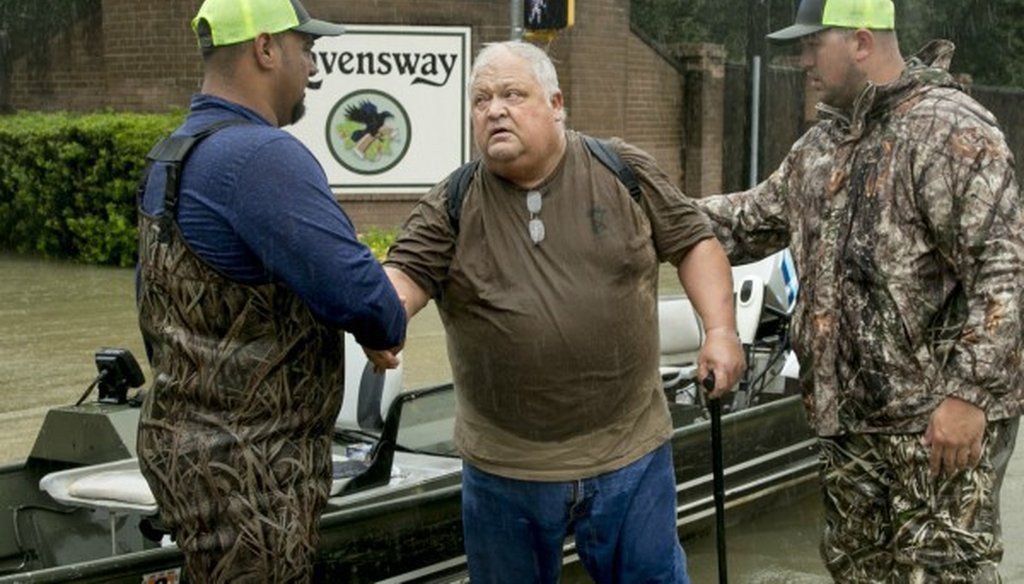Stand up for the facts!
Our only agenda is to publish the truth so you can be an informed participant in democracy.
We need your help.
I would like to contribute

David Emswiler thanks the men rescuing him from his flooded house in Northwest Houston on Aug. 28, 2017. Later, four members of the Texas congressional delegation voted against a plan including hurricane aid (PHOTO: Jay Janner, AUSTIN AMERICAN-STATESMAN).
Four Texans representing landlocked districts fell out of step by voting against the measure containing billions of dollars in Hurricane Harvey relief that was signed into law by President Donald Trump last week.
Three of the four, though, cited rationales that we’re airing out here.
Their shared point: The legislation that won widespread bipartisan support was gummed up with indefensibly lousy fiscal trickery.
To recap, Texas Reps. Joe Barton, Jeb Hensarling, Mac Thornberry and final-termer Sam Johnson each voted against the proposal appropriating nearly $15.3 billion in emergency aid to areas hard-hit by the hurricane that became a lingering and deadly tropical storm last month leaving behind to-be-pinned costs all over southeast Texas.
The House easily approved the proposal, 316-90, and Republican Sens. John Cornyn and Ted Cruz of Texas earlier joined senators finalizing the agreed-upon measure by a voice vote.
Sign up for PolitiFact texts
Put another way, every other Texan in the House--22 Republicans plus 10 Democrats--voted in favor of the proposal, which originated in January as a push to "promote quality basic education in developing countries." (That’s another story perhaps.)
And why did the quartet of Texans vote against the grain?
Helpfully, three of the four issued statements specifying fiscal reasons, as noted in news stories including Austin American-Statesman special correspondent Maria Recio’s account. Johnson did not pipe up.
Let's share:
--Barton, of Ennis, said after Friday’s vote that he objected to the legislation as expanded by the Senate, which had amended the House measure including a smaller level of aid by adding money and folding in a short-term extension (into December) of the federal debt ceiling and tacking on a section continuing federal spending (department by department) at levels previously approved for the fiscal year that runs through this month.
The Senate acted after President Trump agreed to back the three-part approach in a surprise deal with Democratic leaders. Like the Democrats, Republican chiefs had sought to authorize three months of continuing government spending. But the GOP leaders had wanted to extend the debt ceiling until after next year’s mid-term elections rather than be left to act again on raising the politically volatile limit toward the end of 2017. (See the federal debt tallied here.)
Barton said: "I am not against voting for relief programs to help hurricane victims, but I am against raising the public debt ceiling without a plan to reduce deficits in the short term, and eliminate them in the long term. The money we vote to spend today will have to be paid back by our children and grandchildren. We have yet again missed an opportunity for substantial reforms and reduced spending."
--Hensarling, of Dallas, said in his post-nay statement that he wasn’t prepared to vote for "even more national debt without the opportunity to offset it with lower priority spending."
Hensarling added: "The unsustainable national debt remains the greatest existential threat to our nation that is routinely ignored in Washington. If unabated, we will one day be unable to respond to similar emergencies as Hurricane Harvey." He closed: "Emergency spending bills must be restricted to emergency spending."
--Thornberry, of Amarillo. said in his post-vote statement that his greatest concern is the legislation "forces our military to operate under a stopgap continuing resolution--once again." That was a reference to the continuation of current funding levels with no adjustments up or down.
"But the world is not standing still," Thornberry said. "In fact, the threats from North Korea and others grow every day." He closed: "There is plenty of blame to go around between both parties and both the executive and legislative branches of government. But this negligence must stop. We must fulfill our duty. We must do better."
If Johnson shares his reasons for his vote, we'll amend this rundown.
Our Sources
News story, "Why 4 Texans voted against Hurricane Harvey funding," Sept. 8, 2017, Austin American-Statesman
News story, "Senate Attaches Shutdown-Avoiding Measure to Harvey Relief Bill," Government Executive, Sept. 7, 2017
News story, "For some Republicans from Texas, Trump's Harvey deal adds to the fiscal misery," Houston Chronicle, Sept. 11, 2017
Legislation. H.R. 601, "Continuing Appropriations Act, 2018 and Supplemental Appropriations for Disaster Relief Requirements Act, 2017," U.S. House, signed into law by President Donald Trump on Sept. 8, 2017 (accessed Sept. 12, 2017)
Statements by Republican Reps. Joe Barton, Jeb Hensarling, Mac Thornberry after votes on Hurricane Harvey and debt-extension measure, Sept. 8, 2017



































